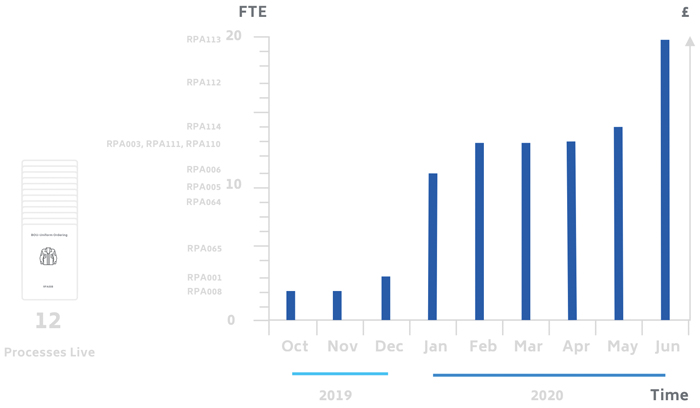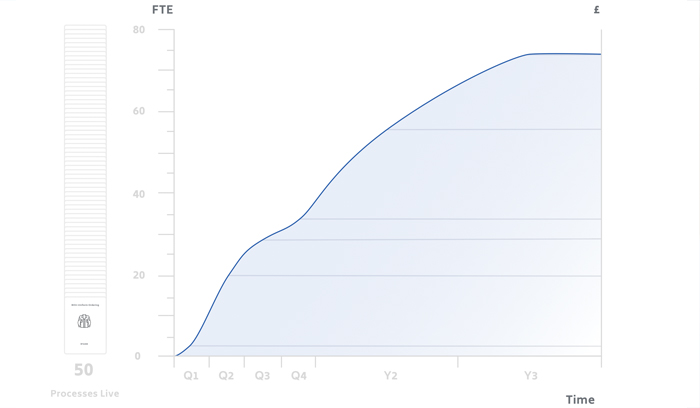Avon and Somerset Constabulary, working with IBM, has created ‘Digital workers’ to take away repetitive tasks that add little business value, enabling officers and support staff to focus on making a real difference to organisational efficiency and quality of service delivery. Luke Mundy, IBM Associate Partner, and Ian Bowman, IBM European Lead, Law Enforcement, explain.
Automation has been a consistent feature in the development of industry, particularly in manufacturing where the advantages of improved consistency, speed and accuracy, human worker safety and higher quality output at lower cost has ultimately led to higher standards of living.
Just as physical robots and machines have transformed manufacturing, automation technology in the form of digital workers is transforming the way businesses carry out their processes.
Apart from niche, hand-built examples at low volume (and high price), you would not dream of manufacturing a car without a level of automation on the production line – production costs would be prohibitive, quality would be variable and speed to completion would be elongated.
Automation in manufacturing has ensured that quality has gone up while delivery times have shortened and price has gone down.
In the same way, Robotic Process Automation (RPA) automates system-based business processes by training software robots or ‘digital workers’ to complete the activities of users in existing IT systems. RPA presents a unique opportunity to augment a workforce with digital workers who remove backlogs, improve accuracy, and empower human workers to focus on delivering value.
Once programmed or ‘trained’, the number of digital workers can be scaled to meet peaks in demand and replicated and re-used across similar processes within an organisation or an industry. The technology is non-invasive, with digital workers logging in and performing tasks just like a human worker.
Private sector organisations have been swift to capitalise on automation technology to stay competitive and improve efficiency, leading to a well proven and competitive technology ripe for application in policing.
Why automation in policing?
Policing is awash with processes designed to ensure accountability and consistency, both in the internal management of any large complex organisation, but also in ensuring that call handling, incident management, crime recording and investigation, victim support and the prosecution of offenders is managed well and in accordance with recognised good practice. Many repetitive processes are carried out hundreds or thousands of times a month.
Even the seemingly straightforward task of creating a monthly finance report may require a team to extract, merge and manipulate data from different systems. The effort to create it is repetitive, error prone and is currently completed by people with scarce skills. The value of that report is not in the act of collection, but in the analysis of the information collected and the improved decision making allowed, which is based on that analysis.
Using RPA, such a report could be created on demand with no human effort – produced more frequently and available to a team with more time to complete that valuable detailed financial analysis, all without changing existing systems or integrations.
In relation to compliance with procedures that have been established to ensure some consistency of policing approach across forces, inspections and audits often find worrying levels of non-compliance, in part because they rely on busy staff, who are providing the best service they can to victims of crime, remembering to tick a box probably at the end of their shift.
Imagine if such processes were fully or partially automated by ‘digital workers’ dedicated to ensuring 100 per cent compliance on behalf of the police officer or police staff member… with of course the significant benefit of being able to operate continuously without rest days or holidays and scheduled to complete tasks at the most appropriate or optimal time of day or night!
Automation provides the same opportunity in many areas of policing processes, enabling forces to allocate their human workers more efficiently and better deliver to the ever higher demands placed upon them.
Avon and Somerset Constabulary is now deploying RPA through a low-risk, high-value approach that has resulted in fantastic feedback from teams who now wonder how they coped without their digital colleagues.
Departments have been able to improve their outputs at the same time as shifting their human workforce to higher value, more interesting, tasks. Not only is there a compelling return on investment, but other major benefits of these 24/7 digital workers include improved accuracy and consistency, data quality, compliance and responsiveness.

Why now?
Forces continue to see increased demand and stretched budgets forcing difficult choices. Members of the public interacting with a force seek self-service and rapid response via channels of their choosing. Employees expect to be empowered and seek more interesting work.
Almost every business process involves an element of repetitive, manual effort to which the worker adds little business value, and policing is no exception. Take a five-step process in which steps one to four are repeatable, logic-driven elements of the process. The team performs tasks one to four in autopilot, using ‘muscle memory’, but it is only in step five when they are making a judgment and delivering actual value to the business.
Worse, workers are frequently tasked to perform processes that deliver no additional value at all but are simply required to do so out of necessity due to systems that are poorly integrated, poorly designed or no longer meet the business requirement – or never did.
Shifting humans to high-value judgment-based tasks is crucial to organisations seeking a competitive edge, as well as those wanting to attract and retain the best talent or deliver to increased demand without increasing cost.
A generation raised on a diet of highly intuitive, cloud based, portable apps are less tolerant of workplaces where talent is wasted and morale lowered through repetitive tasks necessary due to the persistence of cumbersome, antiquated and inefficient legacy systems.
The beauty of automation is that it complements rather than replaces investments in an application estate. It loosely couples non-integrated systems and transforms business processes through adding functionality; transforming the way they are executed rather than transforming existing technology and systems.
The Avon and Somerset journey began with an eight-week proof of concept with IBM to identify the potential value and business impact of deploying digital workers within the force.
The RPA software was tested and proved against key systems, confirming a preferred software supplier, and then used to build and test a single automation for a simple process.
A business case was approved by the police and crime commissioner in September 2019 for RPA to address a queue of work with a scaled automation project. Since September, Avon and Somerset Constabulary has embarked on a three-year automation project with the intention of adding the equivalent of 20 FTE digital workers to their workforce within nine months, and 70 over the course of the project.
The first two automations are live. They are:
Four further automations are built and tested ready for go live with a further extensive 50 automations identified as priorities by the force.
The next automation will be to address the vetting process, which most forces will probably agree is prone to time-consuming manual checking and delays.
A bottom-up approach was taken, involving extensive collaboration with staff to build understanding of automation and then identify and explore potential uses. As staff have grown familiar with the technology, these workshops have identified processes in areas such as fleet management, finance, business ordering, data quality, investigations, HR, vetting and case preparation as candidates for automation.
Not surprisingly, teams benefitting from the first live automations have been unequivocally enthusiastic about their digital colleagues, and the manner in which the business has been closely engaged to bring them to life.
Direct feedback includes:

Why IBM?
As well as extensive automation experience and skills across private and public sector, IBM has a proven and referenceable approach to delivering RPA within the UK policing environment. Forces using IBM services benefit from having a catalogue of process discovery, ‘use’ cases, objects and code available for re-use along with experienced, skilled and cleared personnel.
Forces choosing IBM to help develop their own Automation Centre of Expertise will benefit from the templates, methods and playbook and that will be tailored for individual clients, giving them a high quality framework within which to continue their automation journey.
While it is possible for clients to buy automation software and embark on their own journey, experience from industry is that this does not deliver the same level of automation penetration into the business. It also dramatically lowers the potential ROI (Return on Investment), results in an ad-hoc approach and makes re-use impossible due to the lack of quality control and coordination on the code and objects being created.
IBM delivers automation services at competitive prices and flexible commercial model through a G-Cloud offering and gives clients the opportunity to explore and deploy automation at their own pace while benefitting from the experienced services of an industry leader.
RPA has significant re-use potential if done properly. Not only is the discovery, process assessment and design work documentation cross referenceable and re-usable but, crucially, the objects and code that make up a particular automation can be re-used in subsequent automations that either follow similar processes or use the same systems or both. This means that once an object library has been built, future automations are delivered more rapidly as they will make use of the existing objects.
In an area such as policing, where forces use similar processes and systems, collaboration means that forces can benefit from artefacts and experience as well as contributing to the catalogue of available assets. For re-use to be successful, a tailored approach will almost always be required and a strong understanding of the existing material and automations and how to adapt and implement these to another force. Process discovery with the business will still be required, but the design documentation, objects and code can be tailored from existing work products. It is also possible for forces to quickly review the business case for automation by area to identify quick wins, or revalidate and rule out areas that have been shown to have low automation potential.

Why Blue Prism?
IBM works with all the major vendors for RPA software, and assists clients in their review and decision for a particular technology. Avon and Somerset Constabulary has carefully reviewed the vendors during its Proof of Value and selected Blue Prism as the software of choice, joining other large public sector clients that require a secure platform from which to automate.
Blue Prism is particularly suited for the policing environment; it is a British company, known for security, reliability, scalability and flexibility. A powerful capability allows it to identify each individual element of a software GUI (graphical user interface) and therefore automate a wide array of existing police systems. Re-use is made possible through the ease with which object libraries are created in the software. Through their digital exchange mechanism, sharing of automation code and objects is made simple through public or private exchanges. Deploying to local or cloud infrastructure is straightforward in addition to SaaS (Software as a Service) options.
What next?
Forces that wish to explore the opportunity for automation are encouraged to discuss directly with IBM and arrange a half-day workshop to provide a better understanding of the technology through demonstration, a detailed look at real business cases and a short discovery of their own automation potential.
Automation tends to work best as an ongoing and incremental programme of development. In the first instance, IBM recommends clients undertake a Proof of Value lasting about eight weeks. This allows a detailed business case to be prepared for an individual organisation by conducting process discovery with the business, choosing a suitable RPA software, building and testing an automation ready for go live and preparing the options, costs and ROI of a full delivery phase based on the force priority.
Who to contact?
Please contact your client executives, Natalie Coaten or Mark Goossens for a further discussion.
Discover more on IBM’s automation work in UK Policing by clicking here.
Comment